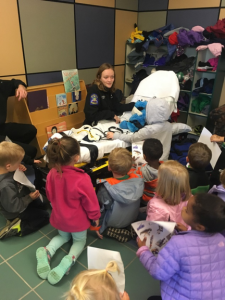
SOMAC at Hamilton Central school
The Max A. Shacknai COVE advises 39 student-led, community-based volunteer teams. These teams cover a wide range of issues and help students build an abundance of skills. Approximately 650 students — representing about 23 percent of the Colgate population participate regularly in a volunteer team. This year, volunteer teams performed more than 23,000 hours of service in the local community.
Outcomes of ongoing service projects include:
- tutored more than 250 local school children in all grade levels
- mentored more than 195 school-aged children
- provided after-school enrichment activities to an additional 75 local children
- improved academic and social confidence of children tutored and mentored
- improved SAT scores of 60 local high school students by 100 points on average
- assisted more than 150 elderly and low-income adults
- served more than 800 individuals at the soup kitchen and food cupboard
- assisted in responding to more than 800 fire and EMS emergency calls
- contributed more than 500 hours responding to Victims of Violence hotline
- provided care to more than 800 shelter animals
- contributed to a cohesive, caring community
Teams reported ever-greater success in:
- creating team reflection time
- practicing regular and open communication with their community partner
- articulating the root causes of social inequity related to the team’s issue areas
- formulating action steps to impact the relevant social issue
- reaching the team’s direct service goal
- reaching the team’s social change goal
This year, we brought on one new volunteer team:
- Colgate Caretakers – Colgate Caretakers works with Abraham House in Utica, a unique hospice that takes in patients with terminal diagnosis and prognosis of three months or less. They provide round-the-clock care in a comfortable, home-like environment to all patients regardless of income level or ability to pay. Volunteers can become a buddy of a trained caretaker, receive free caretaker training at the house, help organize and run fundraising events, plan and attend events at the hospice or on campus, and more.
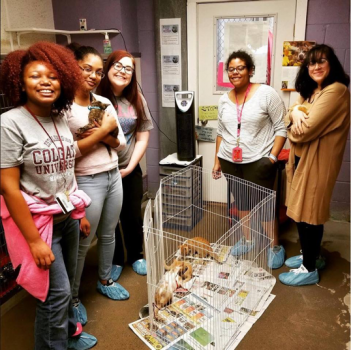
Pet Pals volunteers at Spring Farm Cares
In addition to regular volunteer service, volunteer teams plan a number of complementary events to increase the work and impact of the team. Here’s a sampling of events volunteer teams planned this year in addition to their ongoing direct service work:
- The Colgate Hunger Outreach Program raised funds that were used to fill holiday stockings with hygiene products. These stockings were distributed to families in need during the local Mid York Interfaith Holiday distribution.
- Our education-related teams sponsored two brown bag presentations; one on Critical Pedagogies at the Secondary Level and one on Education in Madison County.
- Habitat for Humanity hosted their annual gingerbread house making competition fundraiser.
- Sidekicks partnered with other mentoring groups to host our Sidekicks Carnival for children from around the community.
- Student volunteers from SOMAC hosted many community awareness events; including an event at Hamilton Elementary School. Children were invited into the ambulance and taught some basic skills on what to do in an emergency.
- Pet Pals held a blanket making night; students gathered to make bedding for animals which were then donated to local animal shelters.
- The American Heart Association team sponsored a Spin-A-Thon and a Burrito Run fundraiser.
- Rotaract sponsored a film screening fundraiser of Get Out at the Hamilton Movie Theater.
- A number of our volunteer and mentoring teams hosted campus visits for their students to have a fun day out eating at Frank and doing a special activity.
- The Network sponsored a Take Back the Night March and Speak Out, offering a safe and supportive opportunity for sexual violence survivors and the people who love them to publicly affirm their transition from victim to survivor.
- The Network partnered with the Haven, Colgate’s survivor support center, to train volunteers for the local sexual violence hotline.
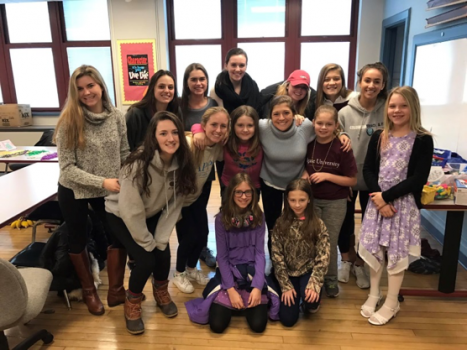
Volunteers at North Broad Street Elementary School with mentees



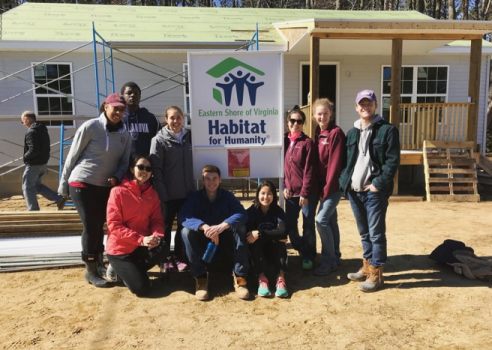
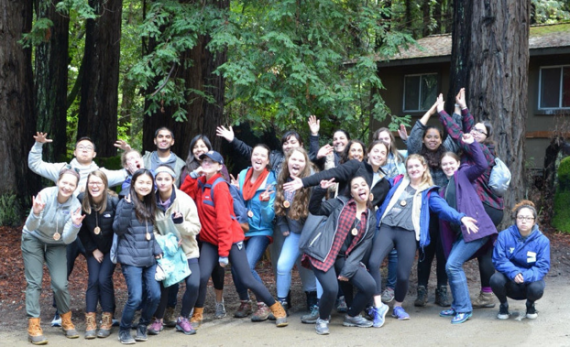
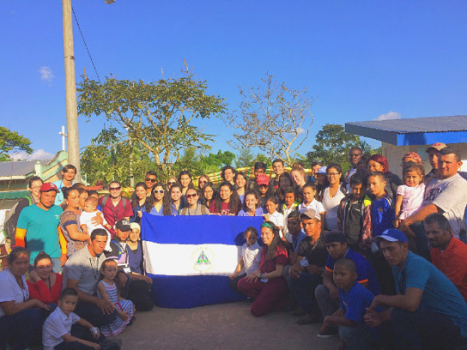
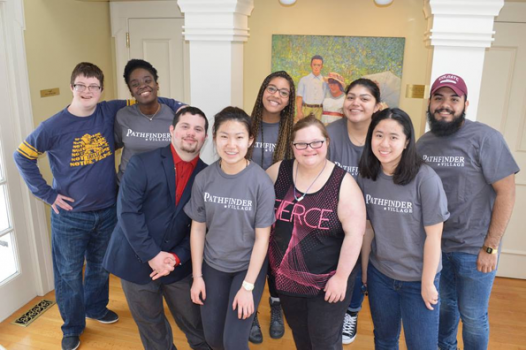
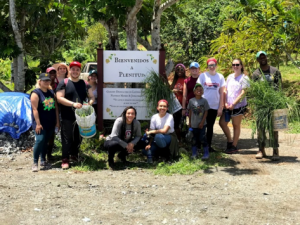 In May, Colgate community members traveled to Puerto Rico for a week devoted to hurricane relief. The group performed service work at Plenitud, a nonprofit educational farm and learning center located in the mountains of western Puerto Rico near a town called Las Marias. Associate Professor of English and Africana and Latin American Studies Kezia Page and Andrew Fagon, executive director for risk management and legal affairs, led the group of 10 undergraduates, composed mostly of students enrolled in CORE Caribbean or Introduction to Caribbean Studies.
In May, Colgate community members traveled to Puerto Rico for a week devoted to hurricane relief. The group performed service work at Plenitud, a nonprofit educational farm and learning center located in the mountains of western Puerto Rico near a town called Las Marias. Associate Professor of English and Africana and Latin American Studies Kezia Page and Andrew Fagon, executive director for risk management and legal affairs, led the group of 10 undergraduates, composed mostly of students enrolled in CORE Caribbean or Introduction to Caribbean Studies.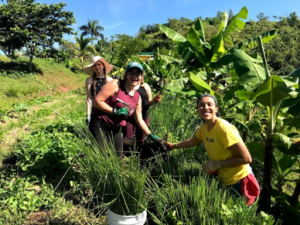 Up and out of their tents at 6 a.m. every day, the team helped build earthbag structures, which are resilient to floods and hurricanes. Bags of soil or sand are layered on top of each other, reinforced with barbed wire, and then covered in adobe or concrete.
Up and out of their tents at 6 a.m. every day, the team helped build earthbag structures, which are resilient to floods and hurricanes. Bags of soil or sand are layered on top of each other, reinforced with barbed wire, and then covered in adobe or concrete.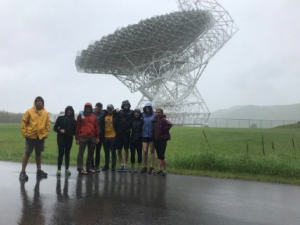
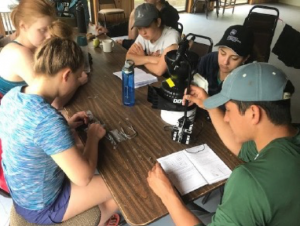
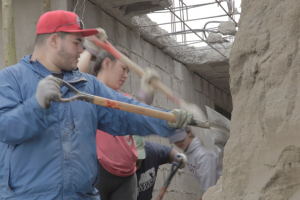 Now in our second year of a partnership with the Lampert Institute for Civic and Global Affairs, we have sent three groups of students to the
Now in our second year of a partnership with the Lampert Institute for Civic and Global Affairs, we have sent three groups of students to the 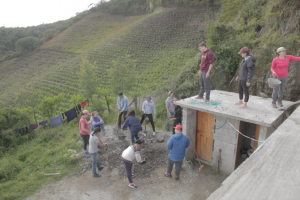 “On most afternoons, the organizers from Tandana had prepared a series of cultural events closely related with the theme of our trip. Within the first couple of days of arrival in Muenala, we were offered a physical and spiritual cleansing to welcome us to the sacred land, which was performed by a traditional healer who explained a number of local customs. Later in the trip, we were taken to Pakarinka, a cultural collective dedicated to the preservation of local Kichwa customs, where we were informed about local farming habits, herbal medicines grown on the property and participated in spiritual and medical rituals, such as diagnosing and healing ills using plants, eggs, and guinea pigs. While there, we prepared and ate a meal cooked in the ground using hot volcanic rocks, a tradition known as pachamanka, which is usually reserved for the four major holidays in Kichwa culture that coincide with the equinoxes and solstices. Midway between these two visits, we were given a class in the Kichwa language as well as Kichwa cosmovisión or worldview. After each of these and other events, there was time for reflection led by the co-directors and Tandana staff. Importantly, the structure of the program allowed for continued learning and increasingly complex conversations about the interactions between spirituality and ecology, both in Highland Ecuador and other areas of the world with which the students were familiar.
“On most afternoons, the organizers from Tandana had prepared a series of cultural events closely related with the theme of our trip. Within the first couple of days of arrival in Muenala, we were offered a physical and spiritual cleansing to welcome us to the sacred land, which was performed by a traditional healer who explained a number of local customs. Later in the trip, we were taken to Pakarinka, a cultural collective dedicated to the preservation of local Kichwa customs, where we were informed about local farming habits, herbal medicines grown on the property and participated in spiritual and medical rituals, such as diagnosing and healing ills using plants, eggs, and guinea pigs. While there, we prepared and ate a meal cooked in the ground using hot volcanic rocks, a tradition known as pachamanka, which is usually reserved for the four major holidays in Kichwa culture that coincide with the equinoxes and solstices. Midway between these two visits, we were given a class in the Kichwa language as well as Kichwa cosmovisión or worldview. After each of these and other events, there was time for reflection led by the co-directors and Tandana staff. Importantly, the structure of the program allowed for continued learning and increasingly complex conversations about the interactions between spirituality and ecology, both in Highland Ecuador and other areas of the world with which the students were familiar.